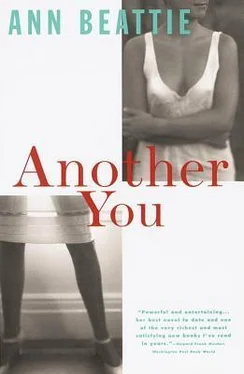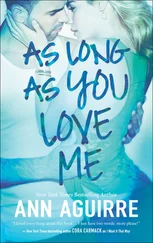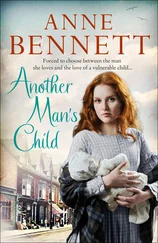Ann Beattie - Another You
Здесь есть возможность читать онлайн «Ann Beattie - Another You» весь текст электронной книги совершенно бесплатно (целиком полную версию без сокращений). В некоторых случаях можно слушать аудио, скачать через торрент в формате fb2 и присутствует краткое содержание. Год выпуска: 2014, Издательство: Vintage Books, Жанр: Современная проза, на английском языке. Описание произведения, (предисловие) а так же отзывы посетителей доступны на портале библиотеки ЛибКат.
- Название:Another You
- Автор:
- Издательство:Vintage Books
- Жанр:
- Год:2014
- ISBN:нет данных
- Рейтинг книги:5 / 5. Голосов: 1
-
Избранное:Добавить в избранное
- Отзывы:
-
Ваша оценка:
- 100
- 1
- 2
- 3
- 4
- 5
Another You: краткое содержание, описание и аннотация
Предлагаем к чтению аннотацию, описание, краткое содержание или предисловие (зависит от того, что написал сам автор книги «Another You»). Если вы не нашли необходимую информацию о книге — напишите в комментариях, мы постараемся отыскать её.
Another You — читать онлайн бесплатно полную книгу (весь текст) целиком
Ниже представлен текст книги, разбитый по страницам. Система сохранения места последней прочитанной страницы, позволяет с удобством читать онлайн бесплатно книгу «Another You», без необходимости каждый раз заново искать на чём Вы остановились. Поставьте закладку, и сможете в любой момент перейти на страницу, на которой закончили чтение.
Интервал:
Закладка:
Martin was born on December 8, 1941—the day after Pearl Harbor. That was when the Americans acknowledged there was a war; everyone in Montreal knew that in 1939, of course. On Christmas Day, Hong Kong was taken by the Japanese. The radio and the fire crackled constantly, and we waited, day after day, for information. I think we all forgot ourselves, forgot our individual lives had real meaning. Strange, the names you remember. Like a song that was being sung by everyone, Miles and the people he talked to on the phone seemed to be in constant contact with a Harvard chemist named Louis Fieser. For a while, it seemed the miraculous substance he was developing in his laboratory would be the solution to the war, and Miles and Ethan Bedell were convinced Fieser should have investors behind him, private investors, as well as the ear of the press, rather than working alone and trusting that the U.S. Army would deal correctly with his product. There were numerous calls every day, instigated by Ethan and by friends of Fieser, who for some reason would not communicate directly with Miles or with Ethan Bedell.
When the baby was born, he was the most wonderful distraction for everyone. Even Gordon loved him from the first. Alice and I would pass him back and forth, taking turns walking with him, rocking him. I felt only a momentary pang of regret when the birth announcements went out saying that Alice and Miles were the parents. I thought we would all be together, always, and that the baby had been born into the most wonderful family imaginable. Instead of seeming an enormous burden, he had suddenly become a great gift. Gifts arrived every day: booties; buntings; toys; a copy of the song “There Will Never Be Another You,” from Ethan Bedell, who had been sent the lyrics by his good friend Mack Gordon. It later played in the film Iceland , and everyone started humming it. It became a classic. I remember sitting with Alice, one of us taking care of the baby, the other reading aloud from Liberty magazine, that song playing in our heads even when we weren’t hearing it. Though we never saw Iceland , we did see, and love, The Palm Beach Story , with Claudette Colbert and Rudy Vallee. Such sweet melodies, such pleasant movies going on while the world was at war. It was like receiving a beautiful infant into our arms and finding that some little thing, still so unformed, yet so wonderful and fascinating, could change all the adults’ personalities. We were all at our best. I would have gone on that way forever. I was so perplexed when Miles declared his love for me, when he suggested we “undo the wrong.” He would have left his marriage, risked social opprobrium, for nothing more than exchanging one wife for another, and nightly sex with me. I thought he was mad, and by then I had the courage to tell him so. Things were fine the way they were. I had no intention of causing any more unhappiness to the woman who had been consistently kind to me, except for a brief moment of shock when she lost sight of the fact that all of us were a unit, saw what her husband and I had done — naturally enough — as betrayal. So there was a time when she had great equilibrium; if she lost it later, that is another matter. Everyone changes through time. When it was most important to have it, she had great equilibrium.
I think he had some mistaken notion of punishing me for not doing what he wanted. The closer she and I became, the more he tried to drive a wedge between us. He gave us a book called Generation of Vipers , which caused a scandal in its time — a book about “Momism” ruining male children! We couldn’t take such a thing seriously. He doted on Gordon and never wanted Martin out of his sight, yet the book said that siblings were essential because women would dote unhealthily on infants!
The next child, Marshall, was her child with him: a beautiful boy born in 1944. This time she showed off her pregnancy, friends gave her showers, and only toward the end did she wonder aloud whether she should have allowed Miles to persuade her that three children were not too many. In a magazine I flipped through today in the activity room, I read about a woman who was already a grandmother giving birth to her daughter and son-in-law’s child after having been inseminated with the embryo, begun in a test tube. I mentioned the article when Sonja was visiting, and she said: “Don’t worry. We won’t ask that of you.” Such a sense of humor. She also seems to have come to terms with her inability to have children. “You’re not supposed to say such things, but I think I’m happy to be spared the pain,” she said. I almost agreed with her, automatically, but then I remembered that I had had a child, that it would not be respectful to his memory to state otherwise. Bad enough not to have set the record straight after so many years, but why say I knew just what she meant, why compound the lie? In her eyes, I am another version of her: a childless woman. Whereas, I had a child in 1941, and he died in 1943, walking toward us on the porch in Maine, having gotten out of bed because the noise of the Fourth of July fireworks had frightened him, the fireworks in the distance, lighting up the sky. At first we thought he had tripped. He was walking toward us in the dim light of the porch, carrying a toy he’d brought from bed, and then he went down, with our arms outstretched and Gordon calling his name, he went down, struck by a cerebral aneurysm, a weakness in the brain that might well have been present at birth. From the time he recovered from colic as an infant, he had never been sick, and there he lay, with all of us so stunned that little Gordon was the first to actually reach him. I fell apart, seizing Gordon, in my panic, as if he’d done something wrong, refusing to acknowledge my child lay on the floor. Apparently, after riding with him in the ambulance to the hospital — I am told Alice jumped in with me, and wouldn’t budge — apparently, after insisting to the doctor that what had happened was because of something I had done, while Alice insisted otherwise, I blacked out, and when I came to, I said nothing for two days. Before I did speak I apparently hiccupped nonstop, while the doctors discussed further sedation and Alice begged them not to do it. The next thing I knew, I was out of the hospital, in their bedroom. For some reason, they had put me in their room, as if I were a frightened child who could be soothed by being taken into the adults’ bed, and when I awoke I had the terrifying, confused sense that a war had begun; that the house had been hit by a bomb, which would account for the darkness, for the sheets tangled on the floor, the discarded clothes, and for Alice’s body, dead in the chair. She was asleep. Not a sound in the house, and not a sound I could bring forth. I kept working backward, fixating on the war, trying to remember when the war had begun. December 1941 , a voice said inside my head. Then I skipped ahead to the porch, to the fireworks, the bright explosions in the sky. I saw Martin walking toward us in slow motion, not a gun in his hand, but a toy tiger, the tiger on the ground, Martin dead — actually dead — beside it.
We lived, all of us, in a trance. I would look down and expect to see him, take a nap in the rocking chair and awaken to feel a pressure on my thighs as if a small child had just sat there, and got up to go elsewhere. Certain colors reminded me of toys he had loved; the color yellow saddened me because he had slept in yellow pajamas. I became convinced Martin’s death was punishment for our sins. They tried to reason with me. If it would make me feel better to declare that the child had been his and mine, Alice said, she would understand completely. It was making her miserable, the way people rushed first to comfort her before turning to Miles or to me — she, who was least important. Miles became angry, telling her to stop dwelling on what he called “biology.” Did he not want the secret told, or did he — quite probably, he did — think that the child’s parentage was hardly an important issue, we had all loved him so much? It did not seem that any of us would ever be happy again. We could not even sit on the back porch. We turned inward, became cross with one another, went to bed ourselves as soon as Gordon was tucked in. And do you know what saved us? I thought of it when Sonja visited, bringing little presents with her. We were saved, looking back, by butter. In his blundering but insistent way, Ethan Bedell arrived at the house with a bottle of French cognac, which, when uncorked, smelled to Alice and to me like nausea itself, and with a large crock of butter. Bread and butter had become such a delicious treat, because we almost always used our red stamps for meat. But there was Ethan, with a large quantity of butter and the promise of an almost endless supply. Eating our buttered bread, we began to cheer up. That tells you how desperate we were.
Читать дальшеИнтервал:
Закладка:
Похожие книги на «Another You»
Представляем Вашему вниманию похожие книги на «Another You» списком для выбора. Мы отобрали схожую по названию и смыслу литературу в надежде предоставить читателям больше вариантов отыскать новые, интересные, ещё непрочитанные произведения.
Обсуждение, отзывы о книге «Another You» и просто собственные мнения читателей. Оставьте ваши комментарии, напишите, что Вы думаете о произведении, его смысле или главных героях. Укажите что конкретно понравилось, а что нет, и почему Вы так считаете.












